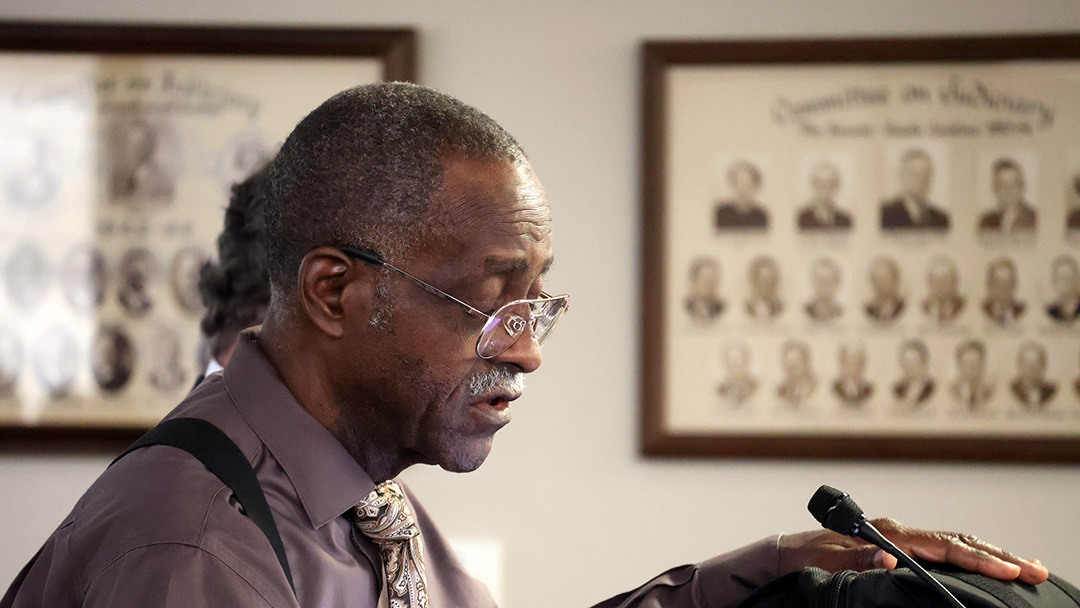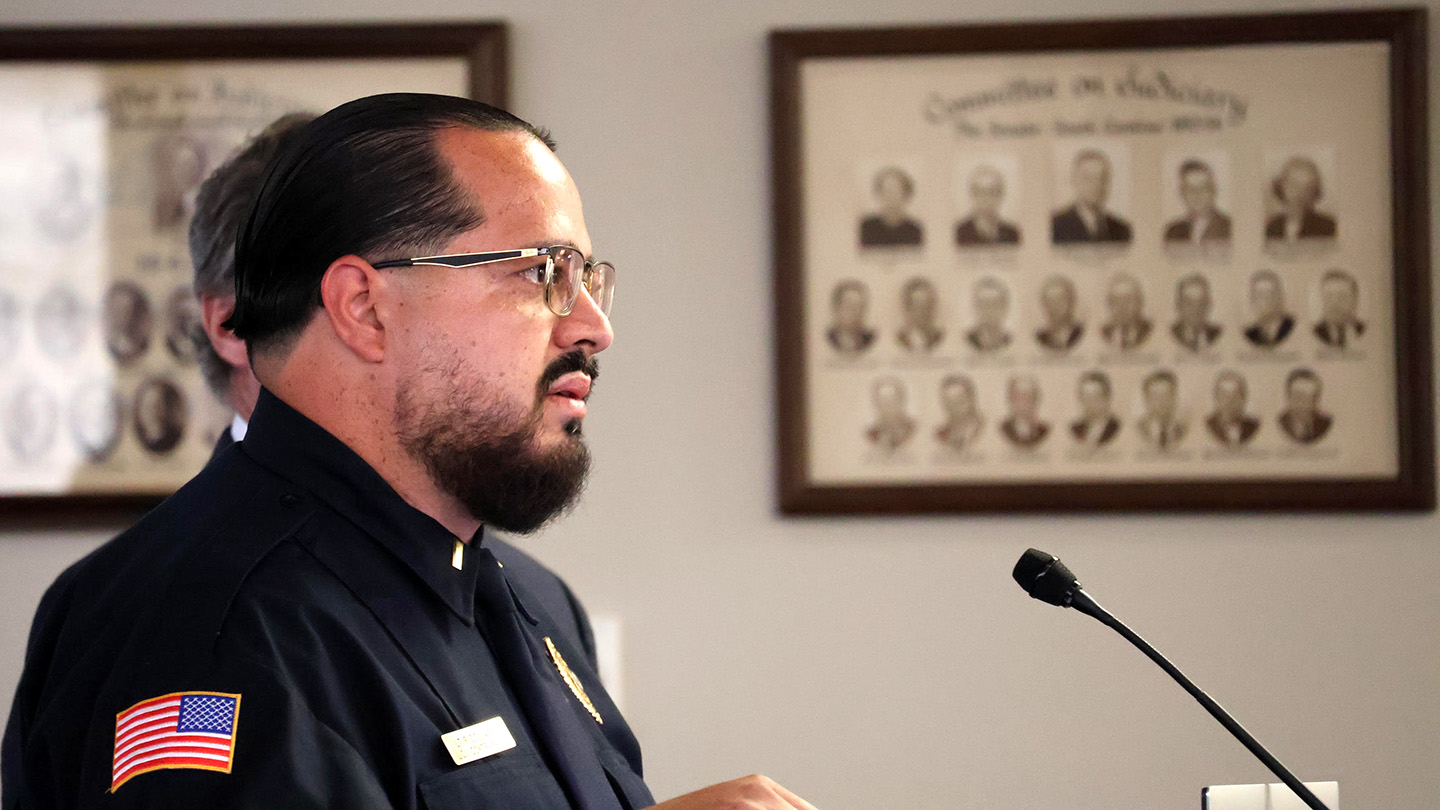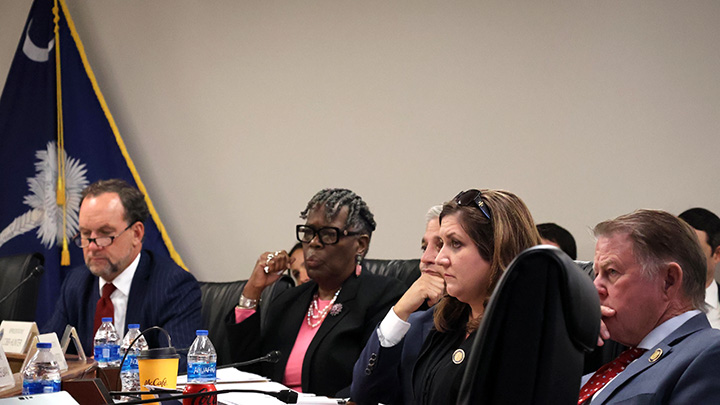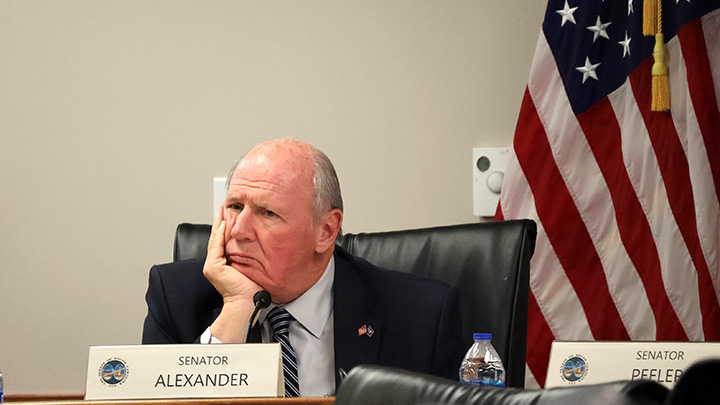Corrections officer Capt. Robert Johnson talks about the negative impact of illegal cell phones in prisons as he speaks before the legislature’s Joint Bond Review Committee on Oct. 10. (Photos by Kate Robins/Carolina News and Reporter)
Capt. Robert Johnson was working in a South Carolina prison when he was shot six times in the abdomen and chest.
The organized hit came from a gang leader, who wanted to retaliate against Johnson for his work on a contraband team.
But one thing stood out about the shooting: The order came from the inside a prison cell.
Johnson is not the only such victim. Others and sometimes their families have been affected by prisoners having access to cell phones.
“One of the bullets went through my left hip, which (will) have to be replaced once the pain becomes unbearable,” Johnson said. “The doctor said it will be a very messy and painful surgery. And there’s a possibility I may end up in a wheelchair. I’m here to tell you, there is no recovery of this type of shooting.”
Department of Corrections leaders on Tuesday requested more state funding to decrease cell phone usage in prisons. They spoke during a Joint Bond Review Committee meeting.
But this isn’t the first year corrections officials have asked for help preventing illegal cell phone calls.
The officials several years ago tried to disable cell phone towers near the prisons by asking phone providers to jam signals.
They faced pushback from phone companies, though, who were worried it would affect customers, and from the courts.
A judge ruled that the Communications Act of 1934, which prohibits states from jamming cell phone towers, prevented the move.
But the department recently received approval from the Federal Communications Commission for another technological maneuver.
The technology identifies phone numbers that are being used illegally inside the prison, and the corrections department then asks phone companies to deactivate the numbers.
The call tracking system has been in use at Lee Correctional Institution in Bishopville since July, according to corrections department director Bryan Stirling.
The prison has disabled 790 phones so far, Stirling said. There are about 1,080 inmates at the prison.
What’s more, legal, landline phone calls have gone up more than 50%, he said.
More funding could put that system in all South Carolina prisons, Stirling said.
“The industry has been my foe in this matter for the entire time,” he said. “But they did come up with a solution, which was identifying these phones and turning them off.”
Illegal cell phone usage fuels gang and violent activity, Stirling said.
Inmates using cell phones also have been able to coordinate “drone drops” with people outside of the prison.
Lt. Franciso Collazo has been working at Lee for eight years and five years ago built a team to fight contraband. The frontline position led a man working with an inmate to set fire to his house, he said.
“The entire time he had a phone in (a) basket and was recording,” Collazo said.
He said he thinks the man was using the phone to talk to the inmate.
Collazo went back to work a week later, and he and his team tracked down a crashed drone. The drone led them to find the man who set fire to his house, Collazo said.
Drones are a key contraband component.
About 250 drones have been flown over South Carolina prison yards since the start of 2023.
The corrections department has added a specialized team to target the drones and uses technology that alerts staff to drones.
The drones fly almost every night, delivering drugs and cell phones to specific inmates, Stirling said. Some are camouflaged to keep officers from finding them.
”They reach out, they get (the delivery) and they distribute,” Stirling said. “That leads to violence inside. That leads to intimidation. That gives the gangs power. That gives the gangs money.”
Lt. Francisco Collazo tells the story to the Joint Bond Review Committee about his house being set on fire in retaliation against the work he has done.
Members of the Joint Bond Review Committee listen to state corrections officials speak about illegal cell phones in prisons.
Sen. Thomas Alexander, R-Oconee, listens as three people explain how illegal cell phone usage in prisons has affected their lives during a Joint Bond Review Committee meeting.





